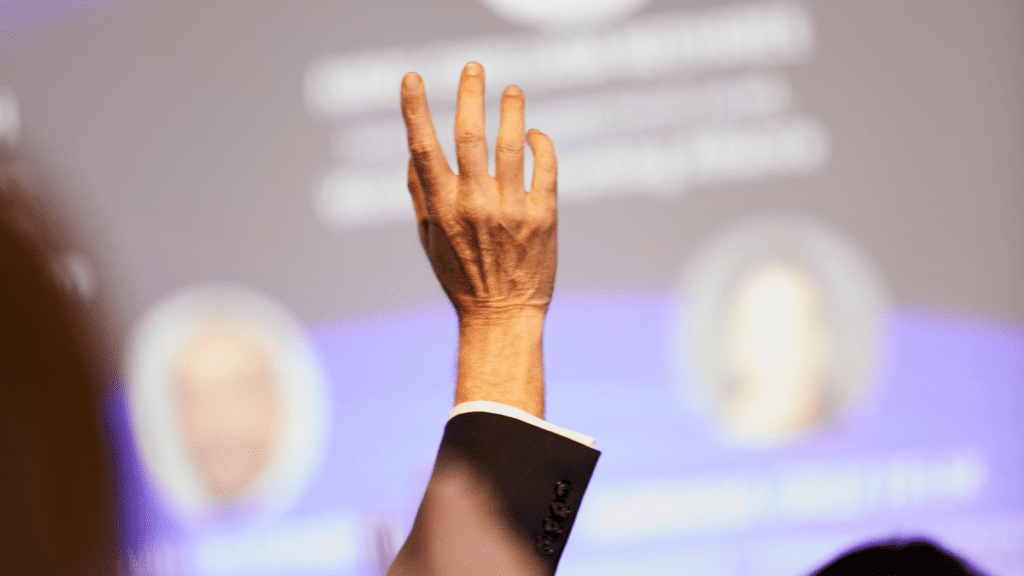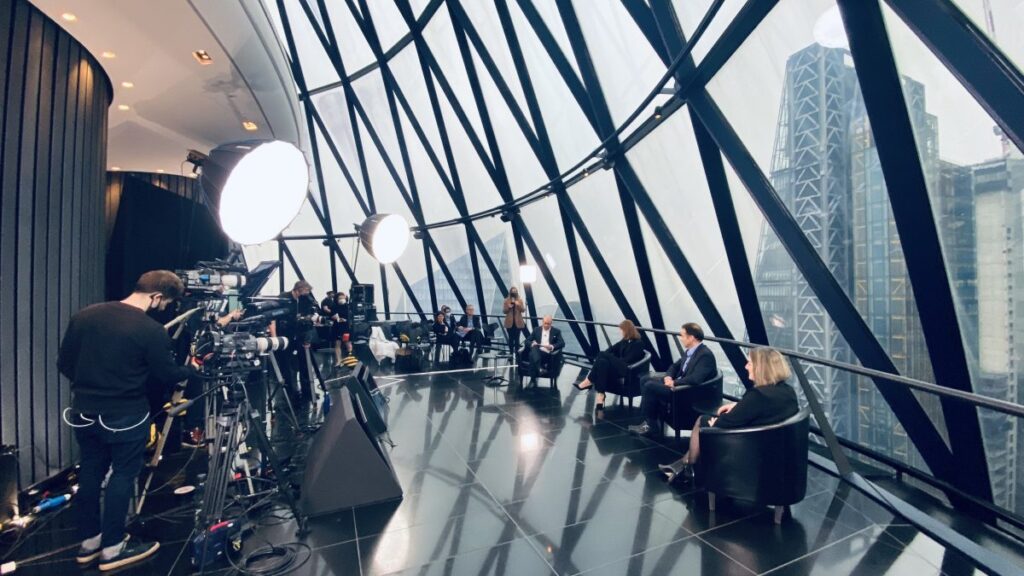Technology Meets Creativity at B. Inspired
The Fundamentals of Planning Finance Events

Years of experience working with clients including financial institutions and professional services companies gives us a unique insight into planning events in the industry. We’ve gathered some industry-specific advice for planning financial industry events whether it’s a large investor conference, trend webinar or smaller executive meeting.
Security is key
Within the finance industry as a whole, cyber security spending is high to keep client data secure and maintain trust. With sensitive data being exchanged at finance events, data security and GDPR compliance remains a top priority.
This is why event technology such as registration websites, content hubs or virtual event sites should be able to process and store event and attendee data securely as well as being securely integrated into existing business systems. Customer experience is vital to any event experience, but for corporate events in particular, clients expect a seamless and professional experience when it comes to digital touch points. A key consideration for event planners in the financial industry is looking for partners rather than suppliers.
Trust is key to building long term client relationships in financial marketing. Event design is important here as the right choice of messaging or a consistent event brand has the ability to resonate with and evoke trust in an audience. There’s a reason that 75% of credit brands use the colour blue in their logo in a bid to convey reliability

Digital Transformation
As the world becomes increasingly digital, financial services firms have had to adapt the way they conduct business and there are exciting opportunities for planners to elevate their event marketing.
Accelerated by the necessary move to virtual events during the pandemic, events have become an increasingly digital marketing channel. Although the past few years has proved that face-to-face interaction cannot be replicated in the same manner online, many smaller in-person events have shifted to virtual solutions such as webinar series or interactive broadcasts as the audience reach and be significantly higher.
The digitisation of events means valuable data and insights can be captured to enhance attendee experience. Digital touch points, from networking apps to on demand video content, are now an expectation among attendees. But for firms, especially fintech businesses, to consolidate their positions as leaders in technology; experiences must be seamless.
Sustainability as part of your event agenda
For professional services companies, considerations of the external environment such as corporate governance are particularly important and with laws coming into place such as the UK’s anti greenwashing campaign and the Financial Conduct Authority expected to introduce its first dedicated anti-greenwashing rule for all its regulated firms at the end of 2023.
In PWC’s Global Investor Survey, investors also say they see sustainability as a priority for companies — and one that calls for greater transparency including the impact of company actions on the environment, and on society.
So how can this be translated to events? If you register for any finance event today, it’s likely there will be a speaker or discussion on sustainability. Try Building sustainability into the event design with reducing, repurposing, and recycling (in that order). Creating a positive legacy post event can also be achieved via engagement with local community charity projects, donating surplus event furniture or volunteering.

Exclusive venue choices
Event destinations may differ based on the concentration of a firm’s employees or target audience, with a broadcast roadshow being streamed from financial hubs across the globe. One thing that remains common for finance events is exclusivity. Event venues should align with the professionalism of a finance event which is why private entrances and proximity to first class hotels for out-of-town guests are on the list for venue searches.
In-office activations have become increasingly popular for corporate events, and we regularly transform client’s office spaces into event, networking, or filming environments. The space can be built around your brand and can communicate your identity to an audience without the cost of hiring a venue.
Calculating return on investment
When planning any event, having a clear vision, messaging, and goals in place to guide planning and calculate ROI is integral. These range from attracting or retaining talent, launching new products, or shaping an identity as a thought leader in the industry and vary by the missions of the business as a whole.
Regarding event budgets, finance events often look to be professionally discrete but high end in contrast to consumer brands that look for maximum brand impact. For these events, goals such as integrity, factuality and transparency outweigh monetary goals.

Informative and engaging
Industry specific events often have a well-informed or senior audience which provides the perfect opportunity for the audience to shape the agenda and create an event programme that encourages open discussion and interactivity. Room layout, breakout rooms, networking activities and agenda personalisation can all encourage more engaged conversations.
One thing that is certain is that a main presentation room is simply not enough and it’s much more effective to have at least an additional exhibition space and a networking space for an audience to be able to explore topics further.
While corporate events usually require lots of info to be jam-packed into agenda, different formats can boost engagement. Attendees can get much more out of a three-day company-wide event and connect with colleagues better through group meeting spaces and online clubs. For a previous company kick-off event, we were able to create a completely digital solution with attendees being able to access exhibit halls, theatres, and a colleague lounge all from a virtual environment. Through two virtual clubs during the event, attendees ran and cycled 8,000 + miles.
Having a successful event strategy means a holistic event programme that integrates into wider marketing activities. While in-person events will remain prominent for flagship dates, virtual and hybrid elements can continue to boost engagement and community between in-person events. Bite-sized, on demand content is particularly effective to build excitement for events.
Ultimately if you are planning an event in the finance industry, you want to create a high end and seamless experience underscored by professionalism. By embracing these principles, event planners can navigate the landscape of finance events and deliver impactful event experiences.
If you’d like further support, finding an experienced event partner is the way to go. Broadsword plans and delivers live and hybrid experiences such as conferences and webinar series with eighteen year’s experience working with professional services firms.
Related insights

Broadsword wins Grand Prix and Best Global Agency at the micebook Awards

